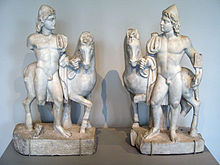
Back Kastor en Polluks Afrikaans Dioskuren ALS كاستور وبولوكس Arabic Cástor y Pólux AST Dioskurlar Azerbaijani Castor asin Pollux BCL Диоскури Bulgarian Dioskured Breton Kastor i Polideuk BS Dioscurs Catalan
| Castor and Pollux καστωρ πολυδευκης | |
|---|---|
Twin gods, patrons of sailors, associated with horsemanship | |
 Statues of Castor and Pollux (3rd century AD) | |
| Other names |
|
| Major cult center | Anakeion |
| Mount | Horses |
| Gender | Male |
| Festivals |
|
| Genealogy | |
| Parents | |
| Siblings | Timandra, Phoebe, Philonoe, Helen of Troy and Clytemnestra |
| Equivalents | |
| Etruscan | Kastur and Pultuce |
| Indo-European | Divine twins |
Castor[a] and Pollux[b] (or Polydeuces)[c] are twin half-brothers in Greek and Roman mythology, known together as the Dioscuri or Dioskouroi.[d]
Their mother was Leda, but they had different fathers; Castor was the mortal son of Tyndareus, the king of Sparta, while Pollux was the divine son of Zeus, who seduced Leda in the guise of a swan.[2] The pair are thus an example of heteropaternal superfecundation. Though accounts of their birth are varied, they are sometimes said to have been born from an egg, along with their twin sisters Helen of Troy and Clytemnestra.
In Latin, the twins are also known as the Gemini[e] ("twins") or Castores,[f] as well as the Tyndaridae[g] or Tyndarids.[h] Pollux asked Zeus to let him share his own immortality with his twin to keep them together, and they were transformed into the constellation Gemini. The pair were regarded as the patrons of sailors, to whom they appeared as St. Elmo's fire. They were also associated with horsemanship, in keeping with their origin as the Indo-European horse twins.
Cite error: There are <ref group=lower-alpha> tags or {{efn}} templates on this page, but the references will not show without a {{reflist|group=lower-alpha}} template or {{notelist}} template (see the help page).
- ^ Bloomsbury (1996), "Dioscuri", Dictionary of Myth, London: Bloomsbury Publishing
- ^ Compare Apollodorus, 1.9.16